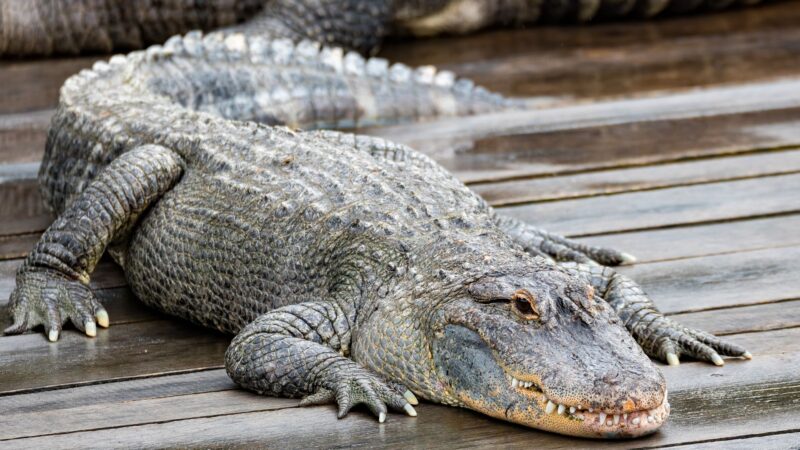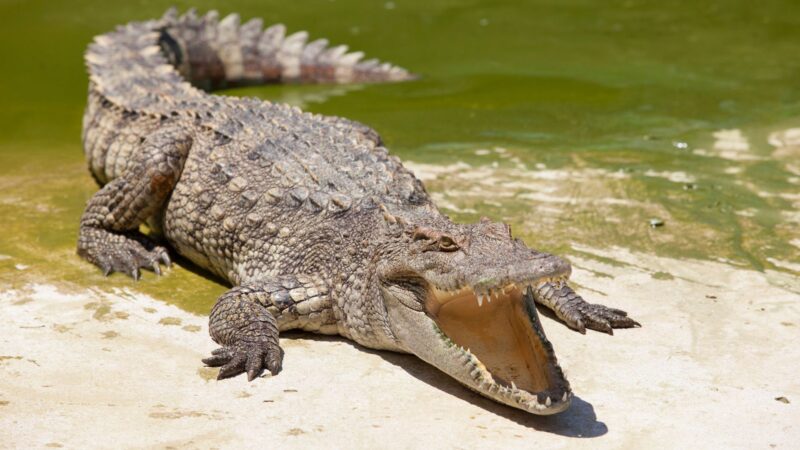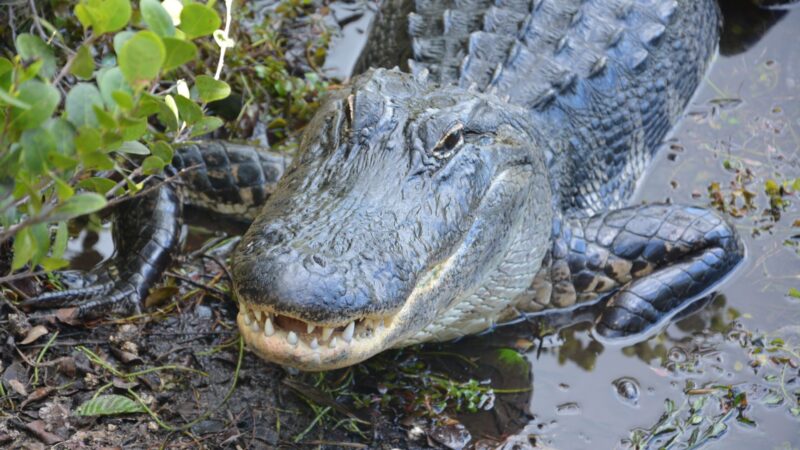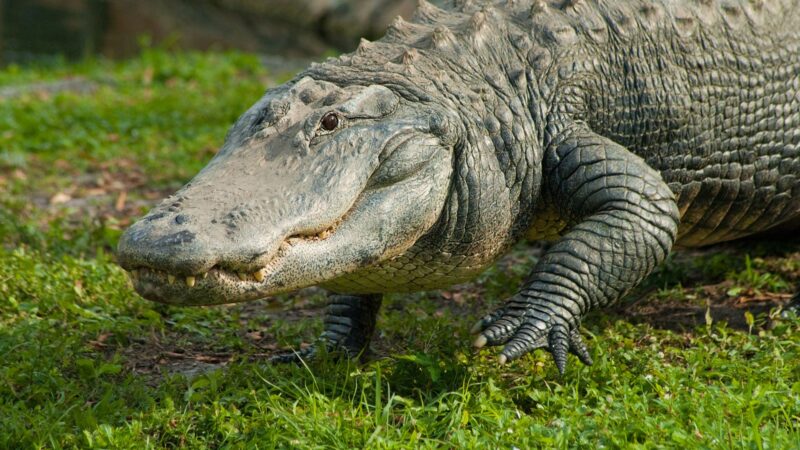American alligators are one of the most feared reptiles in the world. It doesn’t come as a shock since they pose a threat to the safety of humans and animals as well as cause property damage. Getting rid of them is a scary feat but definitely not an impossible one.
Here’s how to get rid of alligators: Contact a local wildlife expert trapper immediately to remove and relocate the animal from the premises. Afterwards, install barriers to prevent them from coming back.
For more information on American alligators, how to properly identify them, how to get rid of them, and prevent them from ever coming back, read further this article!
What Are American Alligators?

Characterized by their muscular, bony-plated bodies, American alligators (Alligator mississippiensis) are large crocodilians with long, rounded snouts and upturned nostrils.
They can be differentiated from crocodiles just by looking at the teeth—they are not visible when their mouth is closed. Currently, there are about 5 million American alligators found in the United States.
What Do American Alligators Eat?
As they continue to develop, the volume and size of the animals American alligators consume get bigger. They are considered generalist carnivores, feeding on any available prey in their surroundings.
A study conducted in 2011 reported a breakdown of their diet. It was composed of invertebrates (15.7% to 34.6%), amphibians and reptiles (11.9% to 26%), mammals (2% to 11.4%), and birds and fish (0% to 11.3%).
How Big Do American Alligators Get?
Generally, American alligators range from 2.6 to 4.4 meters long. The average adult male is 3.4 meters long while the average adult female is 2.6 meters.
They weigh anywhere between 91 to 360 kilograms. However, exceptionally large alligators can weigh up to 460 kilograms.
How Fast Can an Alligator Run?
You’d be surprised how fast alligators actually are. Although they look slow and lazy, they actually have bouts of speed when they can run up to 35 miles per hour on land. In water, they can reach speeds of up to 20 miles per hour.
Where Does American Alligator Live?
In freshwater swamps, marshes, rivers, ponds, and lagoons. Their choice of habitat is due to their low tolerance to saltwater. However, they can occasionally be found in brackish water.
Interestingly, American alligators are known for burrowing into the ground using their snouts and tails. Referred to as gator holes, these serve as safe spaces for the animals to shield themselves against extreme weather.
Of the 5 million alligators in the US, 3 million are found in Louisiana while 1.25 million live in Florida.
How Long Does the American Alligator Live?
The oldest recorded alligators lived up to 56 years in the wild and 73 years in captivity. On average, these reptiles live between 20 to 50 years.
How Long Can American Alligators Go Without Eating?
Alligators are ectotherms, which means they have slow metabolism. Generally, they don’t require a lot of food, especially during the winter season when they barely eat at all. In fact, a 100-pound can eat more than a 800-pound alligator.
As such, these animals can survive without eating for an entire year. In rare situations, they can go 2 to 3 years without food.
Alligator vs. Crocodile: What Are the Real Differences?

American alligators belong to the Alligatoridae family together with caimans while true crocodiles are members of the Crocodylidae family.
The most noticeable difference, however, is in their snouts and teeth. Both alligators and caimans have a wide, round-shaped snout. Because their upper jaws are larger than their lower, no teeth are visible when their mouths are closed.
On the other hand, crocodiles have narrower heads and snouts, resembling a V-shape. When their mouths are closed, you can clearly see their sharp, jagged teeth.
Types of Alligators
Aside from the American alligator, another species of alligator is the Chinese alligator ((Alligator sinensis). It is native to the lower Yangtze River basin in China. They are distinctively yellowish gray with black spots.
Compared to the American alligator, they are smaller in size and have a bony plate located in their upper eyelid, which is similar to their closest relatives—the caimans.
Are American Alligators Endangered?
No, they are a species of least concern according to the International Union for Conservation of Nature (IUCN).
Why Alligators Pose a Serious Threat?
Alligators can attack, injure, and in rare situations, kill humans. In fact, the Florida Fish and Wildlife Conservation Commission reports 56 alligator attacks from 2010 to 2015 alone.
Additionally, they do not even need to be provoked for them to injure people. Florida experiences an average of 9 alligator bites annually, 6 of which usually necessitates medical care.
Lastly, they can also damage structures since they are known to excavate burrows or dens, damaging fences, impoundments, levees, and dikes in the process.
Why Are Alligators So Aggressive?
Alligators, usually those that are less than 4 feet, are naturally fearful of humans as they immediately retreat once they sense humans nearby. Hence, these smaller alligators are not considered threats.
However, larger alligators may be aggressive due to the following reasons:
- Scientifically, the reason behind high levels of aggression associated with alligators is due to their large medulla oblongata, which is responsible for anger and temper
- Alligators are quite territorial. In fact, they are often observed with scars on their bodies during the mating season.
- Aggression is simply in their DNA. Historically, male alligators compete with one another. To the extent that juvenile alligators may even eat other alligators.
Is It Legal to Kill Alligators?

Except during hunting season, killing alligators is prohibited by law in most states. Licenses, permits, and/or hide tags should be acquired prior to engaging in the hunting season.
Check your local state laws and regulations before killing alligators.
How to Get Rid of Alligators in Your Pond?
If you see alligators in your pond, maintain a safe distance away from the animal and contact a licensed nuisance alligator trapper immediately. Do not attempt to remove the animal yourself as it may harm you.
How to Remove Alligators From Your Yard?
Contact a local wildlife professional immediately. They should be equipped with the knowledge and expertise to safely remove and relocate the animal from the premises.
How to Keep American Alligators Away From House?

Keeping alligators far away from your house and property should become a priority, especially if you live in states where they are abundant.
Simply follow these tips to prevent them from entering:
- Establish barriers such as 4-inch thick mesh fences at least 5 feet tall and buried 2 feet into the ground. Wooden or concrete bulkheads can be placed around lakes or along waterways.
- Keep animals out of water sources, even in areas that are designated for swimming. Alligators will immediately think they are prey once they are spotted in the water.
- Never feed alligators at all costs. Other than the fact that it may be illegal in some states to do so, you may unintentionally teach alligators to think that humans are associated with food.
- Avoid disposing of food scraps into water sources and pick up those that are scattered around the vicinity.
- Although habitat modification of wetlands may be unlawful in certain states, you can still simply reduce vegetation surrounding these areas.
List of Sources
Florida Fish and Wildlife Conservation Commission. (n.d.). Living with Alligators: A Florida Reality.
Louisiana Wildlife & Fisheries. (n.d.). Nuisance Alligators.
Nevarez, J. (2009). Crocodilians.
Ober, H. K., Dutton, H. J., Woodward, A. R., Hord, L. J., Giuliano, W. M. (2021). Managing Conflicts With Wildlife: Living With Alligators.
Seay, K. (n.d.). Alligator mississippiensis: Alligator, Gator, American alligator, Florida alligator, Mississippi alligator, Louisiana alligator.
Smithsonian’s National Zoo & Conservation Biology Institute. (n.d.). American Alligator.
- How to Get Rid of Copperheads | Practical Guide - August 27, 2023
- How to Get Rid of Corn Snakes | What Makes Them Aggressive? - August 27, 2023
- How to Get Rid of Alligators | Safety Measures and Removal Methods - July 16, 2023
